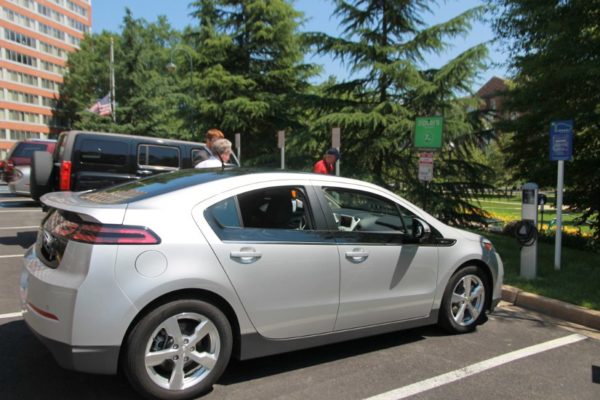Virginia Gov. Terry McAuliffe announced today a plan to fund a public electric vehicle charging network across the state.
McAuliffe’s administration has released a Request for Proposals for the network, which will be paid for with funds from a lawsuit settlement with Volkswagen, stemming from its emissions scandal.
The Commonwealth is seeking to expand the network of public fast charging stations across the state — there are currently only about 100 — to keep up with rising adoption of electric vehicles.
The RFP notes:
The average growth rate of EVs registered in Virginia from 2008 to 2016 is 35%. As of 2016, there were 4,058 EVs registered in Virginia. Assuming this historical growth rate continues, Virginia EV registrations are projected to reach 1.3 million by 2035.
More on the RFP, below, from a press release issued by the governor’s office.
Governor McAuliffe today announced the release of a Request for Proposal (RFP) to deploy an interconnected and statewide public electric vehicle charging network. The request is part of the Governor’s broader Electric Vehicle (EV) Initiative, which is aimed at driving infrastructure investments that will support an overall electric vehicle adoption rate of 15 percent by 2027, equal to approximately 1 million vehicles statewide. Funding, in the amount of $14 million, comes from Virginia’s portion of the Volkswagen settlement.
“Today’s announcement offers an exciting opportunity for the private sector to partner with the Commonwealth to drive greater deployment of electric vehicles in Virginia and I am pleased that we will be able to utilize funds from the Volkswagen settlement to support this project,” said Governor McAuliffe. “By providing the charging network citizens need to move quickly and at long distances throughout Virginia, we will make certain that electric vehicle travel in the Commonwealth is seamless. This infrastructure will also help us to reduce our collective carbon footprint and drive innovation in the new Virginia economy.”
As part of the Volkswagen settlement, which resulted from the use of emissions testing defeat devices in Volkswagen vehicles, Volkswagen is required to establish a nearly $3 billion environmental mitigation trust. Virginia is expected to receive $93.6 million from this trust, and the Commonwealth may spend a maximum of 15 percent on electric vehicle infrastructure.
“Expanding Virginia’s electric vehicle charging infrastructure will contribute to Virginia’s economic diversification by encouraging innovation in electric vehicle technology, making electric vehicle travel easier, and facilitating public-private partnerships throughout the Commonwealth,” said Secretary of Commerce and Trade Todd Haymore. “This targeted and rapid deployment of EV charging stations is designed to jump-start adoption and generate more private investment in EV technology in Virginia.”
In order to develop a robust network of electric vehicle charging stations along the most-traveled portions of the state, Virginia will designate the full 15 percent, representing approximately $14 million dollars, for electric vehicle infrastructure. The Virginia Department of Environmental Quality, the lead agency for the Commonwealth, has issued a request for proposals for allocation of the full $14 million to establish an interconnected and statewide public electric vehicle charging network. Responses to the RFP are due by 2:00pm on Monday November 6, 2017.
“The Department of Environmental Quality, as lead agency on the Volkswagen settlement, is driving an innovative program to deploy electric vehicle infrastructure,” said Molly Ward, Secretary of Natural Resources. “The transportation sector is the largest contributor to nitrogen oxides (NOx) and carbon dioxide emissions, so this program will also help Virginia achieve our air quality and climate change goals.”
Today, Virginia’s Direct Current (DC) fast charging network for electric vehicles consists of 100 DC fast charging stations, underscoring a significant gap in infrastructure in the state.


